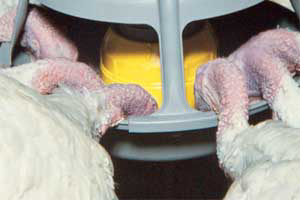Counteracting mycotoxin related problems in animals

Mycotoxins cause a risk for animal health and performance, the management and control of mycotoxins is therefore essential to reduce these harmful effects. Due to the variety of mycotoxin contamination often occurring in animals diets, the negative effects can differ. This requires a multifactorial approach to counteract the impact of these mycotoxins.
By Monique Baecke, mycotoxin specialist, Nutriad, Belgium
It has been estimated that some 25% of the world’s grain crops are affected annually by fungal invasion and mycotoxin contamination. In time of drought, flooding and other natural disasters causing different climatic conditions, mycotoxins are likely to be more prevalent. Consumption of a mycotoxin contaminated diet may result in acute, overt mycotoxicosis with high morbidity and death or chronic disorders which affect production performance. Mycotoxin contamination levels in animal diets are most of the time not high enough to cause acute overt mycotoxicosis but may result in economic loss due to clinically obscure changes in growth, production and immunosuppression. These effects are often difficult to recognise (a hidden threat) because symptoms are associated with infection rather than with the mycotoxin that predisposed the animal to infection; making diagnosis of a mycotoxin related problem difficult and creating unawareness.
Mycotoxin management
Mycotoxins cause a risk for animal health and performance, the management and control of mycotoxins is therefore essential to reduce these harmful effects. Two different approaches are effective solutions to achieve this; monitoring of prevalence of mycotoxins and elimination of mycotoxins in animals diets.
The Toxitest is a unique mycotoxin monitoring tool, developed by Nutriad to provide a quick assessment of mycotoxin contamination in cereals and complete feeds. Nutriad has been on a regular basis since 2007 performing mycotoxin analysis for its worldwide customers to give them insight in the mycotoxin prevalence of their cereals and complete feeds and provide them with cost-efficient solutions to counteract the risk of mycotoxins. Figure 1 shows the results of the Toxitest performed in 2011 from different countries in Europe, Turkey and the CIS countries. A total of 281 samples were analysed on the major mycotoxins: aflatoxins, fumonisins, ochratoxin A, T-2 toxin, deoxynivalenol and zearalenone. The graph shows the percentage positive samples for the different mycotoxins in the diverse commodities.
Detoxification strategies
Diverse extensive surveys and results from Nutriad’s Toxitest show that mycotoxin contamination is significantly present. Not one of the cereals and complete feeds is free from the risk of mycotoxin prevalence. To prevent negative effects of these mycotoxins, successful detoxification strategies are needed. Many approaches have been used to reduce the toxicity of mycotoxin contaminated cereals and complete feeds. The most prevalent method is the addition of a mycotoxin inactivator into the contaminated commodity. However, most methods have been tested on a limited number of specific toxins. Contaminated cereals and feeds are very often contaminated with a number of mycotoxins.
Due to the complexity of all these different mycotoxins, no single strategy has proven completely successful in degrading or removing toxins. Therefore it is desirable that mycotoxin inactivators have broad substrate inactivation capabilities to reduce the toxin’s bioavailability in the gastrointestinal tract and prevent their negative effects in animals. Unike Plus, part of a wider range of products, is such a multifunctional mycotoxin inactivator and is composed out of different components which present a complete solution to counteract a broad range of mycotoxins. The individual components together result in a multifunctional approach to counteract the challenges of mycotoxins and their negative impact on the health and performance of animals by a two way mode of action:
• Detoxification of the mycotoxins
– Adsorption and biotransformation of mycotoxins
• Supporting animal health
– Optimising organs function, boosting immune response, preventing oxidative stress.
Efficacy in animal diets
Throughout the years several successful in vivo trials have been done with Unike Plus. One of these trials was conducted with mycotoxin contaminated diets in turkeys. The aim of that trial was to evaluate the efficacy of this multi mycotoxin inactivator in turkeys fed mycotoxin contaminated diets. In this trial 216 hybrid large white tom turkey poults were raised to 20 weeks of age in 12 pens with each 12 poults per pen.
There were three treatment groups:
- Negative control: mycotoxin free diets, no inclusion of Unike Plus
- Positive control: mycotoxin contamination
- Treatment: mycotoxin contamination + Unike Plus (1.5 kg/tonne).
Diets with natural deoxynivalenol (0.6-5 ppm) and aflatoxins (26-164 ppb) contamination were fed to the turkeys during the trial period. The efficacy of Unike Plus was evaluated by means of the performance data and physiological parameters.
The results in Table 1 and Table 2 show that mycotoxins negatively affected the performance and organ status of turkeys. The turkeys fed the mycotoxin contaminated diets (positive control) showed a decreased body weight, feed consumption and increased FCR compared to the negative control group. Also the organ status was negatively affected in the group fed the mycotoxin contaminated diets, the histological changes in liver and kidney were higher in this group compared to the negative control. Inclusion of Unike Plus in the turkey diets improved performance parameters and established a recovery of organ status. Based on the results of the trial it can be concluded that Unike Plus is an efficacious mycotoxin inactivator to protect turkeys against the negative effects of mycotoxins.
References are available upon request.
[Source: Mycotoxin Special]











